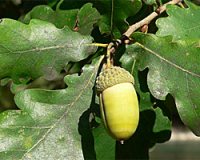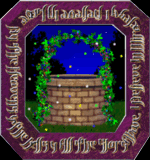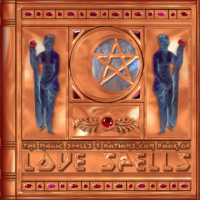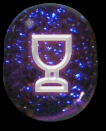Acorn & Oak
This is the well-known fruit of our British Oak, to Which tree it gives the name—Aik, or Eik, Oak. The Acorn was esteemed by Dioscorides, and other old authors, for its supposed medicinal virtues.
Added Jun 12, 2010
| 10,245 Reads
As an article of food the acorn is not known to have been habitually used at any time by the inhabitants of Britain, though acorns furnished the chief support of the large herds of swine on which our forefathers subsisted. The right of maintaining these swine in the woods was called "panage," and formed a valuable property. The earliest inhabitants of Greece and Southern Europe who lived in the primeval forests were supported almost wholly on the fruit of the Oak. They were described by classic authors as fat of person, and were called "balanophagi"—acorn eaters. During the great dearth of 1709 the French were driven to eat bread of acorns steeped in water to destroy the bitterness, and they suffered therefrom injurious effects, such as obstinate constipation, or destructive cholera. It is worth serious notice medically that in years remarkable for a large yield of Acorns disastrous losses have occurred among young cattle from outbreaks of acorn poisoning, or the acorn disease. Those up to two years old suffered most severely, but sheep, pigs and deer were not affected by this acorn malady. Its symptoms are progressive wasting, loss of appetite, diarrhoea, sore places inside the mouth, discharge from [16] the eyes and nostrils, excretion of much pale urine, and no fever, but a fall of temperature below the normal standard. Having regard to which train of symptoms it is fair to suppose the acorn will afford in the human subject a useful specific medicine for the marasmus, or wasting atrophy of young children who are scrofulous. The fruit should be given in the form of a tincture, or vegetable extract, or even admixed (when ground) sparingly with wheaten flour in bread. The dose should fall short of producing any of the above symptoms, and the remedy should be steadily pursued for many weeks. The tincture should be made of saturated strength with spirit of wine on the bruised acorns, to stand for a fortnight before being decanted. Then the dose will be from twenty to thirty drops with water three or four times a day. The Acorn contains chemically starch, a fixed oil, citric acid, uncrystallizable sugar, and another special sugar called "quercit." Acorns, when roasted and powdered, have been sometimes employed as a fair substitute for coffee. By distillation they will yield an ardent spirit. Dr. Burnett strongly commends a "distilled spirit of acorns" as an antidote to the effects of alcohol, where the spleen and kidneys have already suffered, with induced dropsy. It acts on the principle of similars, ten drops being given three times a day in water. In certain parts of Europe it is customary to place acorns in the hands of the newly dead; whilst in other districts an apple is put into the palm of a child when lying in its little coffin. The bark of an oak tree, and the galls, or apples, produced on its leaves, or twigs, by an insect named [17] cynips, are very astringent, by reason of the gallo-tannic acid which they furnish abundantly. This acid, given as a drug, or the strong decoction of oak bark which contains it, will serve to restrain bleedings if taken internally; and finely powdered oak bark, when inhaled pretty frequently, has proved very beneficial against consumption of the lungs in its early stages. Working tanners are well known to be particularly exempt from this disease, probably through their constantly inhaling the peculiar aroma given off from the tan pits; and a like effect may be produced by using as snuff the fresh oak bark dried and reduced to an impalpable powder, or by inhaling day after day the steam given off from recent oak bark infused in boiling water. Marble galls are formed on the back of young twigs, artichoke galls at their extremities, and currant galls by spangles on the under surface of the leaves. From these spangles females presently emerge, and lay their eggs on the catkins, giving rise to the round shining currant galls. The Oak—Quercus robur—is so named from the Celtic "quer," beautiful; and "cuez," a tree. "Drus," another Celtic word for tree, and particularly for the Oak, gave rise to the terms Dryads and Druids. Among the Greeks and Romans a chaplet of oak was one of the highest honours which could be conferred on a citizen. Ancient oaks exist in several parts of England, which are traditionally called Gospel oaks, because it was the practice in times long past when beating the bounds of a parish to read a portion of the Gospel on Ascension Day beneath an oak tree which was growing on the boundary line of the district. Cross oaks were planted at the juncture of cross roads, so that persons suffering from ague might peg a lock of their hair into the trunks, and by wrenching themselves away might leave the hair and the malady in the tree together. A strong decoction of oak bark is most usefully applied for prolapse of the lower bowel. Oak Apple day (May 29th) is called in Hampshire "Shikshak" day.
Added Jun 12, 2010
| 10,245 Reads
Share The Magic ...
The GoE MONEY!!! Course - A Course In Real MONEY MAGIC!
|





















